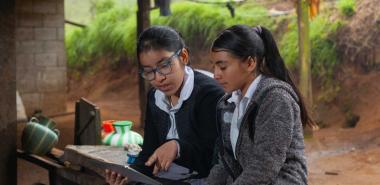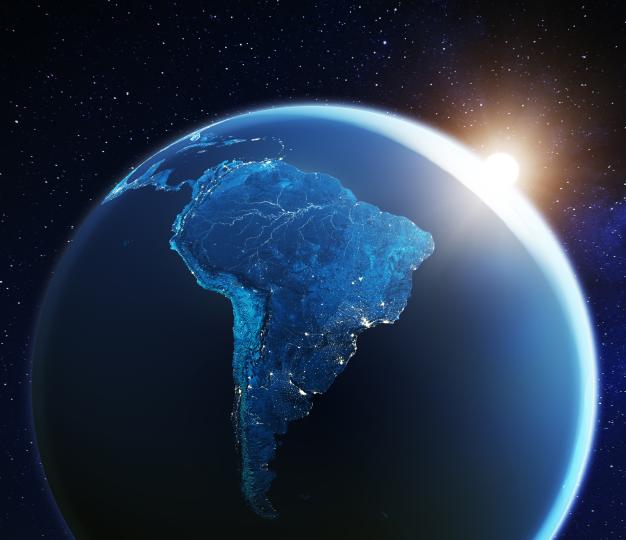Latin America and the Caribbean
EU-LAC relations are based on a multi-layered and flexible approach. Here you can learn about the many ways EU and Latin America and the Caribbean support and strengthen their geopolitical relationship.
In Focus
The EU and Latin America and the Caribbean: A renewed political partnership
Since the first bi-regional Summit was held in Rio de Janeiro in 1999, the EU and LAC have established a privileged partnership. This was renewed at the last EU-CELAC (Community of Latin American and Caribbean States) Summit in July 2023. Today, the two regions are moving from natural partners to partners of choice to address global challenges and defend common interests in a challenging geopolitical environment.
EU-LAC relations are based on a multi-layered and flexible approach. This includes the bi-regional EU-CELAC summits (next one in 2025 in Colombia) and the thematic initiatives of the 2023-2025 EU-CELAC Roadmap, as well as cooperation with sub-regional organizations and with each country at bilateral level.
EU and LAC for a fair, green and digital transition with support from Global Gateway
The EU and LAC are working together for a fair, green and digital transition at many levels, from international negotiations to many practical projects and programmes on the ground, including by rolling out the Global Gateway Investment Agenda in LAC.
At least 30% of all EU financial assistance in LAC aims to support climate action.
In the EU-LAC Digital Alliance both regions work together to achieve a human-centric and sustainable digital transition.
The Global Gateway strategy contributes to these priorities, by mobilising both private capital and public funding for transparent and high-quality investments in sustainable development, in line with the SDGs.
Strengthening a common EU-LAC trade and investment agenda
The EU and LAC have a dense network of Association, Trade or Political & Cooperation Agreements. The EU is the LAC’s third largest trade partner, after the US and China.
- EU-CELAC total trade in goods (2023): EUR 285.5 billion
- EU-CELAC total trade in services (2022): EUR 109.5 billion
- Total EU And CELAC trade has increased by 45% since 2013
The EU is the leading investor in the LAC region, with Foreign Direct Investment (FDI) stocks at about € 741 billion in 2022, approximately the same amount of the combined EU Foreign Direct Investments in China, India, Japan and Russia.
EU investments support 2.75 million jobs in the LAC region, and EU jobs linked to exports to LAC amount to more than 1 million.
Building a vibrant EU-LAC people-to-people partnership
People to people and international cultural relations, as well as parliamentary diplomacy and civil society networks are important elements of the EU-LAC partnership.
The regions’ diverse cultural expressions, heritage, links and vibrant creative industries provide enormous potential to promote shared values, as well as sustainable development and intercultural dialogue. One example of this cooperation was the EU’s participation as Guest of Honour at the 2023 edition of the International Book Fair in Guadalajara (Mexico) –the most important book fair in the Spanish-speaking world.
Youth and researchers are also at the core of the EU LAC partnership: through Erasmus+ and Horizon Europe, and in particular the Marie Skłodowska-Curie Actions, the EU supports mobility for eligible citizens from both regions.
EU and CELAC Member States’ cultural institutions and practitioners are essential partners in the development of solid and far reaching people to people partnerships.
EU-LAC Joining forces in the fight against transnational organised crime
The impact of transnational organized crime is affecting citizens’ security in both the EU and LAC. In their efforts to make large profits, criminal networks use extreme violence, corruption and intimidation.
At the last EU-CELAC Summit (July 2023, Brussels), both regions reinforced their commitment to strengthen cooperation in the field of citizen security and social justice, by further enhancing the EU-LAC Partnership on Justice and Security. The EU-CELAC 2023-25 Roadmap, presented at the Summit, included as a first important joint endeavour the convening of an EU-CLASI Ministerial meeting, which agreed a joint declaration in Brussels on 28 September 2023. Through the EU-CELAC Mechanism for coordination and cooperation on Drugs, both sides work towards a set of common objectives for the next 5 years agreed in February 2024 in the La Paz Declaration.
Several cooperation programs accompany the operationalisation of joint priorities in combatting transnational crime such as EL PACCTO and EUROFRONT, and to improve drug policies (COPOLAD).
EU-LAC working together to promote peace, democracy, human rights and humanitarian aid
Democracy and human rights are at the heart of the EU-LAC partnership. The EU works together with LAC to protect and promote human rights, both civil and political as well as economic, social and cultural, through a wide range of mechanisms. Both regions are committed to strengthening the multilateral human rights system, and to cooperating regionally.
The EU works with key actors in LAC for the implementation of humanitarian aid programmes and emergency response, including through civil protection cooperation.
The EU and LAC also partner to promote peace and security at the global, regional and country level.

















